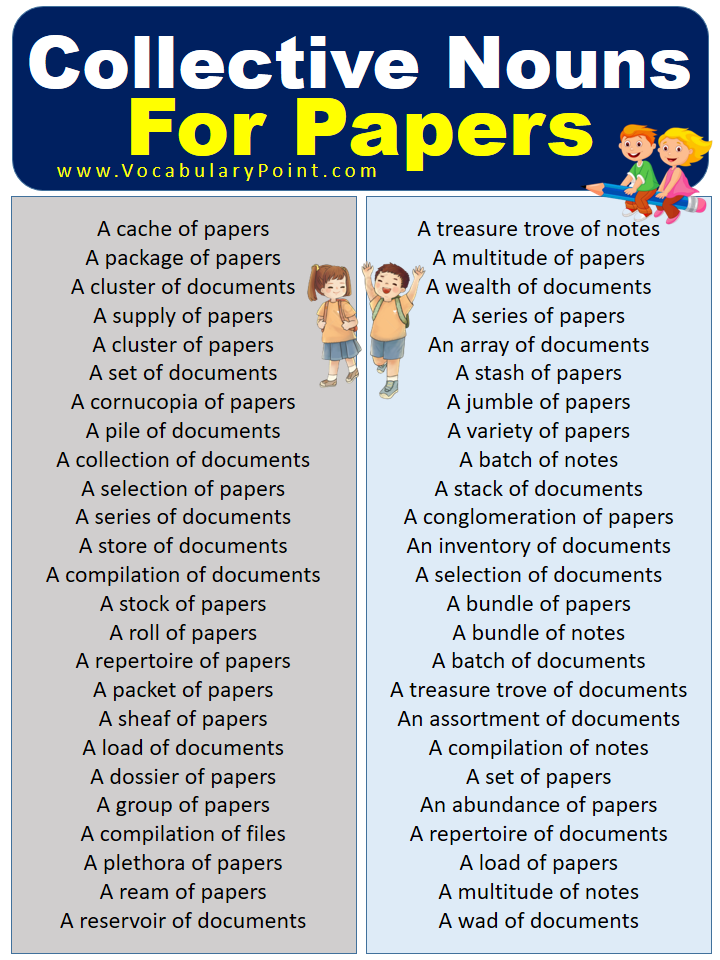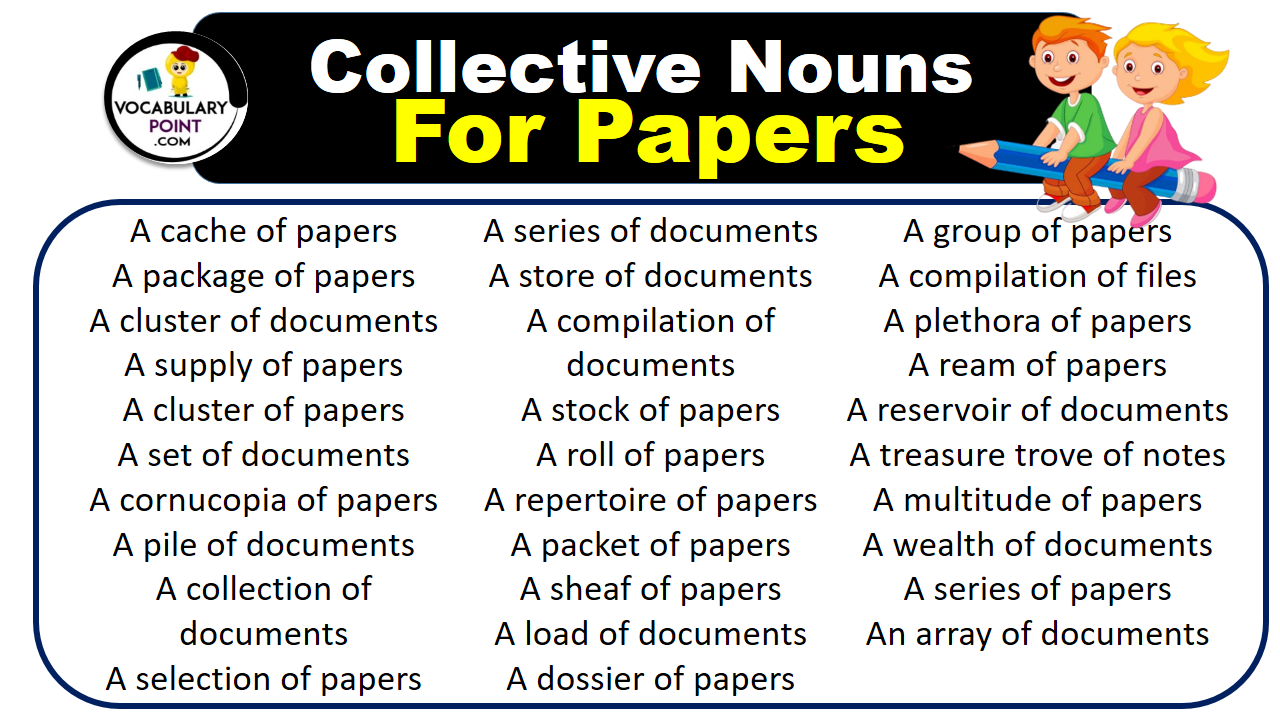Collective nouns are a fascinating aspect of the English language, serving as a means to describe groups of people, animals, objects, or concepts. While we may be familiar with terms like herd, flock, or swarm when referring to animals, did you know that there are collective nouns specifically designed for papers? Yes, papers! In this article, we will explore the intriguing world of collective nouns for papers and delve into their meanings and examples. So whether you’re an avid reader or an aspiring writer looking to expand your vocabulary repertoire, get ready to discover some unique and engaging ways to describe collections of papers with these extraordinary collective nouns.
What is the Collective Noun For Papers?
The collective noun for papers is “a stack of papers” or “a pile of papers.” This term is commonly used to refer to a group of loose papers or documents that are placed on top of each other. For example, you might say, “I have a stack of papers on my desk that need to be sorted.”
Here are the 10 Collective Nouns For Papers:
- A sheaf of papers
- A bundle of papers
- A ream of papers
- A stack of papers
- A mound of papers
- A heap of papers
- A cluster of papers
- A batch of papers
- A load of papers
- A collection of papers
Collective Nouns For Papers
- A cache of papers
- A package of papers
- A cluster of documents
- A supply of papers
- A cluster of papers
- A set of documents
- A cornucopia of papers
- A pile of documents
- A collection of documents
- A selection of papers
- A series of documents
- A store of documents
- A compilation of documents
- A stock of papers
- A roll of papers
- A repertoire of papers
- A packet of papers
- A sheaf of papers
- A load of documents
- A dossier of papers
- A group of papers
- A compilation of files
- A plethora of papers
- A ream of papers
- A reservoir of documents
- A treasure trove of notes
- A multitude of papers
- A wealth of documents
- A series of papers
- An array of documents
- A stash of papers
- A jumble of papers
- A variety of papers
- A batch of notes
- A stack of documents
- A conglomeration of papers
- An inventory of documents
- A selection of documents
- A bundle of papers
- A bundle of notes
- A batch of documents
- A treasure trove of documents
- An assortment of documents
- A compilation of notes
- A set of papers
- An abundance of papers
- A repertoire of documents
- A load of papers
- A multitude of notes
- A wad of documents
- A stock of documents
- A hoard of notes
- A stack of papers
- A bunch of documents
- A hoard of papers
- A heap of papers
- An assortment of papers
- A portfolio of papers
- A wealth of papers
- An assortment of files
- A reservoir of papers
- A pack of documents
- A gathering of documents
- A pile of papers
- A mound of papers
- A kit of documents
- A bundle of documents
- A host of papers
- A stockpile of documents
- A store of papers
- A kit of papers
- A batch of papers
- An assembly of papers
- A wad of papers
- A multitude of documents
- A bunch of papers
- An assortment of notes
- A folder of papers
- A mass of papers
- A compendium of papers
- A collection of papers
- A range of papers
- A stockpile of papers
- A volume of papers
- A treasure trove of papers
- An accumulation of papers
- A set of notes
- A stash of documents
- A range of documents
- An accumulation of documents
- A gathering of papers
- A folder of documents
- A pack of papers
- An inventory of papers
- A file of papers
- A compilation of papers
- A package of documents
- An archive of papers
- A package of notes
- An array of papers
Must Read: Collective Nouns For People

Collective Nouns For Papers With Meaning and Examples
- Ream:
Meaning: A quantity of paper usually packaged together.
Examples:
- I need a ream of paper for the office.
- The stationery store sells reams of various sizes.
- Please bring me a ream of white A4 paper.
- Stack:
Meaning: A vertical arrangement of paper sheets.
Examples:
- The printer produced a stack of invoices.
- He organized the documents in a neat stack.
- Can you hand me that stack of reports?
- Sheaf:
Meaning: A collection of papers fastened together.
Examples:
- The secretary handed out sheaves of meeting agendas.
- The researcher carried a sheaf of notes to the conference.
- She tied the sheaf of papers with a colorful ribbon.
- Bundle:
Meaning: A grouping of papers secured by binding or wrapping.
Examples:
- The courier delivered a bundle of legal documents.
- The librarian tied a bundle of old newspapers.
- He carried a bundle of letters from the post office.
- Folio:
Meaning: A sheet of paper folded in half to form two leaves.
Examples:
- The ancient map was printed on a folio.
- The artist worked on a folio-sized canvas.
- The manuscript was written on parchment folios.
- Packet:
Meaning: A compact grouping of papers.
Examples:
- The teacher distributed packets of practice exercises.
- I received a packet of important forms from the HR department.
- She carried a packet of presentation slides.
- Batch:
Meaning: A quantity of papers handled collectively.
Examples:
- The editor reviewed a batch of articles.
- The printer worked on a batch of flyers.
- The assistant organized a batch of invoices.
- Dossier:
Meaning: A file or collection containing detailed information.
Examples:
- The detective assembled a dossier of evidence.
- The HR department maintains employee dossiers.
- The researcher presented a dossier on endangered species.
- Folder:
Meaning: A protective covering to store papers.
Examples:
- She kept her certificates in a folder.
- The project manager handed out folders with meeting materials.
- The presentation slides were saved in a digital folder.
- Pile:
Meaning: A haphazard accumulation of papers.
Examples:
- There was a pile of documents on his desk.
- I sorted through the pile of old letters.
- The office was cluttered with a pile of papers.
- Collection:
Meaning: An assortment of papers organized based on a common factor.
Examples:
- The museum displayed a collection of historical papers.
- She amassed a collection of recipes from different cultures.
- The exhibition showcased an art collection of various artists’ works on paper.
- Archive:
Meaning: A repository of documents for future access.
Examples:
- The library’s archive holds valuable manuscripts.
- The university’s archive contains ancient scrolls.
- The company’s archive stores past financial reports.
- Bunch:
Meaning: A casually gathered group of papers.
Examples:
- He handed me a bunch of handwritten notes.
- She brought a bunch of printed photographs.
- The students left a bunch of crumpled papers in the trash bin.
- Compilation:
Meaning: A gathering of information from different origins.
Examples:
- The researcher created a compilation of scientific studies.
- The editor prepared a compilation of short stories.
- The annual report was a compilation of financial data.
- Portion:
Meaning: A segment of a larger set of papers.
Examples:
- He analyzed a portion of the data.
- She handed out portions of the research paper to her team.
- The book is divided into different portions.
- Set:
Meaning: A fixed quantity of papers forming a unit.
Examples:
- The stationery store sells sets of notepads.
- The conference materials were provided in sets.
- The teacher distributed a set of worksheets to the students.
- File:
Meaning: A systematically organized group of papers.
Examples:
- The accountant kept the receipts in a file.
- She retrieved the necessary documents from the file.
- The lawyer reviewed the client’s file.
- Album:
Meaning: A book-like collection of various papers.
Examples:
- The family album contains cherished memories.
- The journalist carried an album of press cuttings.
- She created an album with samples of her artwork.
- Packet:
Meaning: A compact grouping of papers.
Examples:
- The teacher distributed packets of practice exercises.
- I received a packet of important forms from the HR department.
- She carried a packet of presentation slides.
- Compendium:
Meaning: A thorough and concise summary of information.
Examples:
- The professor compiled a compendium of research papers.
- The compendium covered various topics related to literature.
- The compendium was a valuable resource for students preparing for exams.
